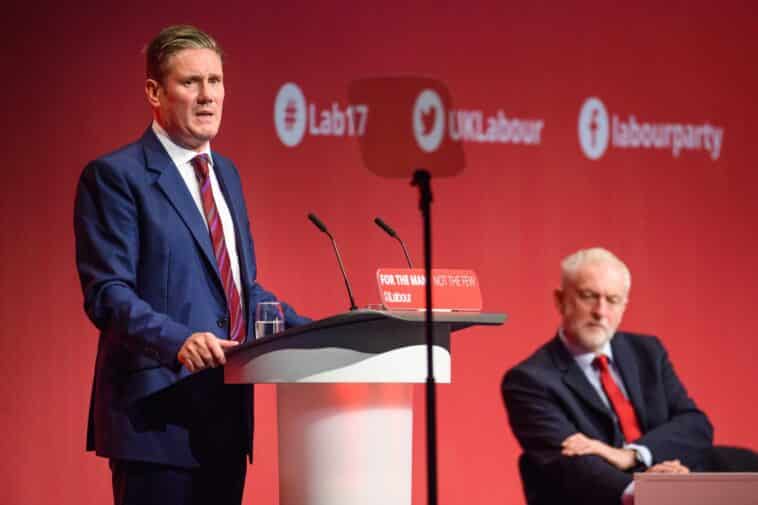

By Peter Main
THE DECISION of Labour’s NEC to expel members and supporters of four socialist groups signals the end of the tumultuous chapter in the party’s history that began with the unexpected election of Jeremy Corbyn as its leader.
The ruling that merely signing an open letter, forwarding a link or retweeting a post is sufficient to qualify for expulsion makes it clear that this is not simply a purge of the actual members of those four groups.
Nor is it aimed solely at those who joined after Corbyn’s election. Socialist Appeal has been active in the party for decades; Graham Bash of the Labour Representation Committee has been a member for 50 years. The expulsion of Ken Loach is also meant to underline that reputation and public profile will not stand in the way of the witch-hunters. This is a purge of all socialists; when Angela Rayner said, ‘If I have to suspend thousands and thousands of members, we will do that’, this is what she meant.
Whatever the justifiable outrage of individuals, the response to the purge must, of course, be collective. Branch and constituency parties should refuse to recognise expulsions of their members. Already, some CLPs have adopted resolutions opposing the purge and no doubt more will follow. Equally, the petition circulated by Defend the Left deserves the support of all party members.
Conference
The Brighton conference, too, should be the focus of protests and lobbying of delegates. The prospects, however, are not good. The party is now completely controlled by the right wing apparatus that never accepted the election of Corbyn and was prepared to sabotage elections to prevent a Labour victory under him. Worse, the silence of the ‘official’ left within the Labour Party, such as the Socialist Campaign Group or Momentum, has been deafening. It is not enough to only speak out when a celebrity like Ken Loach is kicked out. As he himself put it in his open letter:
“While some on the left have vocally opposed these actions, many others—individuals and organisations—think that by keeping their heads down they will not be targeted. They are wrong. They will be targeted—it’s just a matter of time.”
It would be easy to explain the ’heads down’ attitude as a lack of political spine, but that does not get to the heart of the matter, the question of political strategy. In short, it is the reformist belief that socialist policies will only ever be introduced by a Labour government and that, therefore, socialists have to remain in the party, whatever the short term discomforts.
Marxism?
Socialist Appeal, one of the four proscribed organisations, even gives this recipe for passivity a Marxist gloss arguing, ‘whatever the immediate outcome of this particular struggle, Marxism will continue to grow from strength to strength, given the organic crisis of capitalism. There can be no doubt of this. Marxism is more relevant than ever before. The right wing has forgotten a simple lesson: No force on earth can stop an idea whose time has come.’
So, that’s alright then!
What the comrades overlook is that Marxist ideas have been right for well over 150 years. The point is that, as Marx himself said, ideas only become a force when they are taken up and used by the masses. For that, an organisation, a party, is needed to take the ideas into the struggles of the masses.
Electoralism
The Corbyn surge offered an opportunity to do that. Hundreds of thousands, clearly enthused by the prospect of a real fight against Tory austerity, flooded into Labour. It would be difficult to think of a more positive scenario—but what became of it? Defeat, and of the worst kind, defeat without a fight.
The flood was dammed by two major obstacles. Firstly, the existing left within the party, including Jeremy Corbyn himself, were hamstrung by their strategic conviction that the party had to be held together, giving the right wing a veto over policy.
The very structure of the party was the other obstacle. The apparatus of officials and the network of office holders, MPs and councillors were always in a position to thwart any initiative from the membership. They believed that they were the party; the members were there simply to support them, pay their salaries and get the vote out for them.
The cement that held the whole barrier together was electoralism, the belief that a parliamentary majority is the prerequisite for progress of any kind. To win a majority, the party had to be ‘credible’, had to pander to the Tory press, had to be patriotic and had, in short, to prove it is not socialist.
To bring in a real workers’ government that can overthrow capitalism and open up the road to socialism, we need a different kind of party, where elections are a tactic used to spread socialist ideas and if elected act as a tribune for the poor and downtrodden; where mass direct action and the formation of workers’ councils are central to our strategy; and where thpe party members are in democratic control, while being united in action behind majority decisions.